|
|
|
Sort Order |
|
|
|
Items / Page
|
|
|
|
|
|
|
| Srl | Item |
| 1 |
ID:
145124
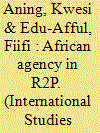

|
|
|
|
|
| Summary/Abstract |
Both the African Union (AU) and the Economic Community of West African States (ECOWAS) have been global leaders in embracing and operationalizing responsibility to protect (R2P). The adoption of the AU’s Constitutive Act, Article 4 (h) in 2000, has transformed its old-fashioned principle of noninterference to one of nonindifference. This authorizes the AU to intervene in Member States with respect to war crimes, genocide, ethnic cleansing, and crimes against humanity. ECOWAS has through its conflict prevention, management, and resolution protocol and its conflict prevention framework deepened and practicalized the notion of sovereignty as responsibility. These frameworks from both the AU and the ECOWAS have close similarities to the R2P norms. However, although these notions are captured in official documents, their actual operationalization faces challenges relating to sovereignty, limited institutional capacity, a restricted appetite for enforcement action, and a lack of explicit instruments to activate their intervention clauses in R2P-like situations. In spite of these challenges, the article argues that the initiatives of both the AU and the ECOWAS in Mali, Cote d’Ivoire, and Libya demonstrated a positively active African agency in contributing to global peace processes. This article, therefore, assesses the successes and limitations of African regional agency in enforcing R2P-like norms among its member states and its implications for and contributions to global international relations discourses.
|
|
|
|
|
|
|
|
|
|
|
|
|
|
|
|
| 2 |
ID:
060357
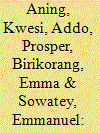

|
|
|
|
|
| Publication |
Nairobi, African Human Security Initiative, 2004.
|
| Description |
x, 91p.
|
| Standard Number |
1919913556
|
|
|
|
|
|
|
|
|
|
|
|
Copies: C:1/I:0,R:0,Q:0
Circulation
| Accession# | Call# | Current Location | Status | Policy | Location |
| 049452 | 327.1720967/ANI 049452 | Main | On Shelf | General | |
|
|
|
|
| 3 |
ID:
183864
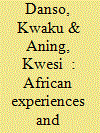

|
|
|
|
|
| Summary/Abstract |
Deconstructing International Relations (IR) episteme acknowledges its generation of power imbalances in security knowledge that relegate African experiences to the margins of global politics. Central to this process of relegation is a pervasive ‘methodological whiteness’, which, while eliding coloniality and racism, projects white experience as a universal perspective. Accompanying this Eurocentric bias has been the intrusive projection of the Weberian state as the most effective site for security governance and conflict prevention on a continent with states that are characterized by a hybridity of political orders, which deviate substantially from the ideal-type state that they seek to mimic. Not only has this resulted in disastrous policies in many parts of Africa, but critical questions arise as to the relevance of conventional IR and security studies as neutral sites for dispassionate knowledge production and policy-making on African security, thereby necessitating alternative perspectives. This article reflects on the ways in which IR and security studies have been responsible, in part, for the production of a racialized mode of security knowledge generation that obfuscates the security policies and experiences of people in African locales. It draws on insights from post-colonial discourses and the episteme of alternativity to explore how the study of events and processes in Africa in a theoretically conscious manner could advance IR scholarship as a whole. It contends that incorporating African experiences as they manifest through hybrid security orders can broaden the empirical base for IR theorizing about security since they offer another perspective outside the conventional western assumptions and experiences.
|
|
|
|
|
|
|
|
|
|
|
|
|
|
|
|
| 4 |
ID:
080433
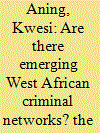

|
|
|
|
|
| Publication |
2007.
|
| Summary/Abstract |
This paper situates discussions about emerging African Criminal Networks (ACN) within Ghana specifically, and West Africa generally, and seeks to present the initial results of an empirically based study on the activities of transnational organised criminal (TOCs) groups in Ghana. The paper argues that the nature of state and statehood in Africa and its inability to establish effective regulatory mechanisms contributes to the rise of these particular types of criminal groups. It begins by conceptualising the place of Ghanaian and West African criminal groups within the framework of international crime. Furthermore, it undertakes an in-depth analysis of three types of crimes; namely computer and internet crime, drug trafficking and (artisanal) small arms manufacture and smuggling in Ghana. By applying a set of standard variables and criteria, the paper evaluates the growth of TNCs in these three issue-areas and how such activities potentially undermine public institutions like the Ghana Police Service (GPS), customs, excise and preventive services (CEPS), judiciary, banking and political parties and political institutions in Ghana. Finally, it seeks to offer an explanatory framework for the growth and acceptance by local communities of the activities of organised crime in Ghana by situating this within a cultural ethos and the social welfare roles played by those involved in such crimes
|
|
|
|
|
|
|
|
|
|
|
|
|
|
|
|
| 5 |
ID:
083082
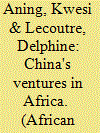

|
|
|
| 6 |
ID:
119281
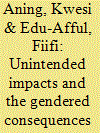

|
|
|
|
|
| Publication |
2013.
|
| Summary/Abstract |
Despite increased international attention to managing the potential impacts of peacekeeping on host countries, unintended consequences continue to emerge. This article focuses particularly on the alternative economies that peacekeeping operations generate and the differential economic impacts on individuals who come into contact with peacekeepers. Based on empirical evidence derived from fieldwork in Liberia, the article highlights the everyday lives of women whose livelihoods have been affected by the presence of peacekeeping missions. It also discusses how such economies adjust during the peacekeeping drawdown phase, and explores the dynamics that such economies have on specific segments of the Liberian population. The argument is that, while peacekeeping economies are critical in stimulating the local economy and providing livelihoods during and in the immediate aftermath of war, they have negative unintended impacts that need mitigation.
|
|
|
|
|
|
|
|
|
|
|
|
|
|
|
|
| 7 |
ID:
152745
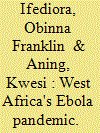

|
|
|
|
|
| Summary/Abstract |
The Ebola virus disease (EVD) outbreak in West Africa in 2014 became the region's most dangerous pandemic in history. Initially misdiagnosed by health authorities in Liberia, Guinea, and Sierra Leone, the epicenters of the crises, the wider health infrastructure of the international community similarly failed to grasp the enormity of the challenge posed by this pandemic to West Africa and its potential global ramifications. By the time recognition dawned about the immensity of the challenges that were posed by this pandemic, it took the introduction of extraordinary measures through the characterization of the disease as a threat to international peace and security pursuant to Chapter VII of the UN Charter to get the necessary institutional and bureaucratic machineries to intervene. This article argues that EVD, disastrous in its outcome, exposed the weaknesses and failures of existing institutional frameworks at national, regional, and continental to global levels. Focusing primarily on multilateral responses (the UN, the African Union [AU], and the Economic Community of West African States [ECOWAS]) to the epidemic, this article argues for enhanced global-regional collaboration in the context of the UN Charter's Chapter VIII for more effective future responses to health crises in West Africa. This article contributes to the ongoing debate on the reform of global health governance by analyzing the existing health governance strategies established by ECOWAS and implemented through the West African Health Organization.
|
|
|
|
|
|
|
|
|
|
|
|
|
|
|
|
|
|
|
|
|